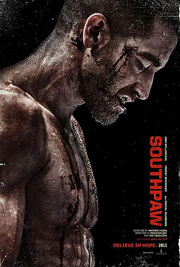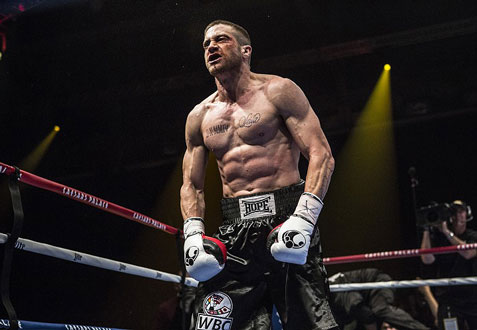
Throughout the years, boxing movies have been synonymous with tales of redemption – from “Rocky,” to “Raging Bull,” to “The Fighter” – and Antoine Fuqua’s “Southpaw” is no different. In fact, you’d be hard-pressed to find anything in the story that hasn’t already appeared countless times before in other boxing films, but despite the clichéd plot, the movie isn’t without its charms. At the top of that list is star Jake Gyllenhaal, who continues his remarkable career reinvention from pretty-boy leading man to serious actor with yet another fantastic performance. It likely won’t earn him the Oscar nomination he was wrongfully snubbed for last year’s “Nightcrawler,” but it builds upon that transformative role with such mature confidence that it only seems like a matter of time before he’s finally rewarded for his work.
The movie opens with undefeated light heavyweight champion Billy “The Great” Hope (Gyllenhaal) successfully defending his title at Madison Square Garden and cementing his status as one of the best boxers in the sport. Everyone wants their chance to go toe-to-toe with him in the ring, including hotshot fighter Miguel Escobar (Miguel Gomez), but Billy’s levelheaded wife, Maureen (Rachel McAdams), urges him to make the sensible decision and call it quits while he’s still on top… and before he becomes so punch drunk that he can’t enjoy his success. When Miguel instigates a fight with him at a charity fundraiser and Maureen is shot and killed among the chaos, Billy spirals out of control, landing himself in trouble with the boxing league and losing his house, his possessions, and most importantly, custody of his daughter Leila (Oona Laurence). Desperate to keep her out of the foster care system where he spent his childhood, Billy seeks help from a gruff, veteran trainer (Forest Whitaker) to get back what he lost.
“Southpaw” might as well have been made 30 years ago – that’s how much it relies on the same tired clichés like the big training montage, the climactic final fight and more. The main character’s surname is Hope, for crying out loud, and Fuqua doesn’t shy away from laying the symbolism on thick, including a cheesy scene where Billy’s daughter (now living under the care of child protective services after his breakdown) asks him to quiz her on the spelling of “hopelessness.” It’s one of the few eye-rolling moments in “Southpaw,” but fortunately, the film avoids dragging itself too far into melodrama thanks to some excellent performances and an otherwise solid screenplay by Kurt Sutter that may not bring anything new to the table narratively, but is as brutal and emotionally charged as you’d expect from the “Sons of Anarchy” creator. Maureen’s death is particularly gut-wrenching, not only because of the writing and performances, but also the unforgiving way in which Fuqua shoots the scene.
Sutter originally wrote “Southpaw” for Eminem as a sort of spiritual successor to “8 Mile” and a metaphor for the rapper’s own custody battle for his daughter, but it was a good thing that he turned it down, because Gyllenhaal brings a physicality and intensity to the role that Eminem just doesn’t seem capable of delivering. Unlike the lean and wily Lou Bloom in “Nightcrawler,” Billy Hope is a tattooed, musclebound beast of a man who’s so self-destructive that he has a reputation for fighting better the more he gets hit. It’s a much more complex role than it appears on the surface, and Gyllenhaal knocks it out of the park. Whitaker is also great as the boxing gym owner who agrees to train Billy when no one else will touch him (and their scenes together are some of the film’s best), while McAdams makes the most of what could have been a throwaway role. She’s only in the movie for about 30 minutes, but it’s crucial that Fuqua cast an actress who would leave a big impression, because her presence can be felt throughout the entire film.
Also worth mentioning are the boxing sequences, which were shot using the HBO crew that films the real-life fights, bringing a level of legitimacy to the movie that only further highlights how committed Gyllenhaal was to making his performance as realistic as possible. (He didn’t use any body doubles, and it shows.) This is an actor who can do no wrong at the moment. He’s picking the right films at the right time, and he’s delivering his best work in the process. “Southpaw” is perhaps his most impressive piece of acting to date, if only because he’s managed to take a fairly standard redemption story and elevate it on the strength of his shoulders alone. The movie isn’t quite on the same level as the true boxing greats, but with Gyllenhaal’s knockout performance front and center, it’s a lot more enjoyable than it probably had any right to be.
Related Posts
Posted in: Entertainment, Movie Reviews, Movies
Tags: Antoine Fuqua, Forest Whitaker, Jake Gyllenhaal, Rachel McAdams, Southpaw, Southpaw review
















